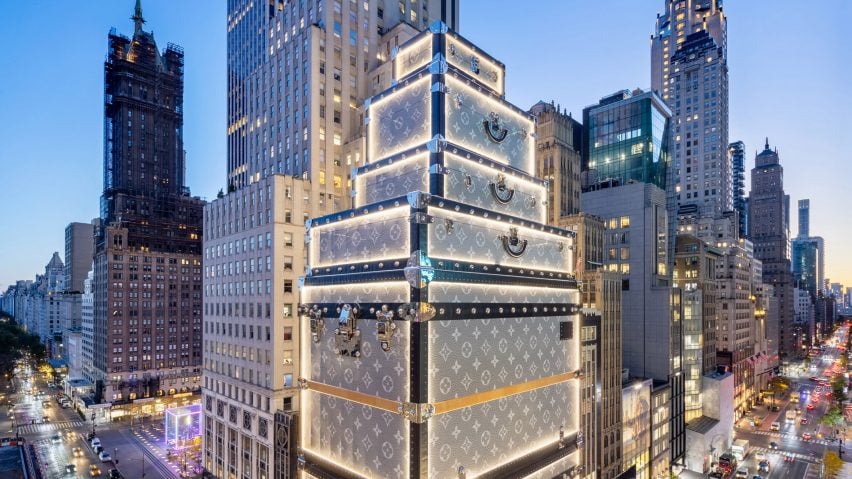Fashion brand Louis Vuitton has concealed its under-renovation New York flagship store with a luggage facade and relocated to a temporary store that features OMA-designed sculptures.
Louis Vuitton covered its flagship at East 57th Street and 5th Avenue in a facade modelled after the brand's distinctive trunks, while simultaneously opening a temporary location around the corner, with sculptures developed with OMA partner Shohei Shigematsu that rise through an atrium.
Designed by Louis Vuitton's in-house team, the luggage facade wraps completely around the construction underway at the New York City flagship. It resembles six, grey trunks of various sizes stacked in descending size.
According to the team, the design pays homage to the brand's Trianon Grey canvas, a light grey textile which dates back to the 19th century.
Details such as handles, locks, rivets and silver hardware are also represented on the facade, with the team noting the largest of the handles "weighs 5,000 pounds".
"It is finished with the classic detailing synonymous with Louis Vuitton's savoir-faire including handles, signature locks, and silver hardware rendered in chrome-plated, laser-cut steel," said Louis Vuitton.
"3D scans of real Louis Vuitton hard-sided trunks were used to create the locks and latches, and the steel corners have been hand-welded. The stack features 840 rivets, each etched with the moniker 'Louis Vuitton'."
Strips of lighting run along each of the trunk's perimeters, while bands of black and brown represent leather lining.
While construction takes place at the flagship, the brand has relocated its retail operations to a five-storey building around the corner at 6 East 57th Street, which contains four floors inhabited by a chocolate shop, men's and women's wear, and the debut of the brand's first cafe in the US.
The building's exterior architecture and interior floorplan remain unchanged according to the team, although it is now outfitted in a material palette of light woods, creams and shades of brown amongst an exposed concrete structure.
Four, towering 16-meter-tall sculptures developed by Shigematsu sit in the lobby atrium, similarly modelled after "iconic" trunks.
"The trunks are built at the ateliers to actual product specifications and stacked to erect shifting, counterbalancing, twisting and zigzagging forms showcasing strength and lightness," said the team.
"Each is further distinguished by using different Louis Vuitton materials – historic stripes, classic Monogram canvas, white Damier, and a metallic Monogram – which have redefined the timeless piece from the past to today."
Elsewhere in the store, furniture pieces from the nearby flagship "reappear" in keeping with the brand's "commitment to circular creativity" and were mixed with new pieces by designers such as Carlo Mollino, Charlotte Perriand, Christophe Delcourt and Pierre Augustin Rose.
Oversized, sculptures of a giraffe and ostrich and a screen with Louis Vuitton motifs cover the building's facade, which was also lined with bright exterior pendants.
The flagship construction could "potentially" double the size of the store, according to New York Yimby, while the temporary location will shut down after the renovation is complete.
"Between the store's engaging spaces and the whimsical world within the cafe, Louis Vuitton 57th Street NYC is a temporary store that aspires to leave a lasting impression for New Yorkers and travellers alike," said the team.
Louis Vuitton often taps luminaries from the design and architecture industries for its projects.
Frank Gehrey recently designed a watch and handbag for the brand, while the North American head of its parent company LVMH recently spoke about an overarching commitment to sustainability.
The photography is courtesy of Louis Vuitton unless otherwise noted.

